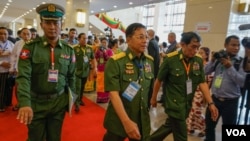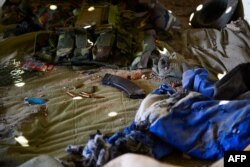China’s special envoy on Asian affairs met with Myanmar’s military chief on Tuesday in the aftermath of clashes along the border between Myanmar and China that left at least three Chinese citizens dead.
Senior Gen. Min Aung Hlaing held talks with Sun Guoxiang in Myanmar’s capital city of Nay Pyi Taw. The two discussed border security and the delay of an upcoming round of talks that are part of a longstanding effort to end fighting between ethnic armies and Myanmar’s military.
The Myanmar Defense Ministry reported that the Chinese envoy denounced the violence in Myanmar’s Shan state.
Thirty-two people died after the Ta'ang National Liberation Army (TNLA) launched an operation early on May 12 on the outskirts of Muse, a busy border area between Myanmar's Shan state and China's Yunnan Province. TNLA, which belongs to the Northern Alliance -- a coalition of four armed ethnic groups -- said in a statement that it was retaliating for a push by Myanmar's military against another ethnic insurgent group, the KIA.
Two days later more fighting erupted in the same area, and both China and the United States called for restraint in the often restive region.
At least three Chinese nationals died in the outbursts of violence.
Beijing has urged ethnic rebel groups, which remain hostile to the military, to join the third session of the 21st Century Panglong Conference, which had been planned for this month but is now delayed. The conference is also known as the Union Peace Conference and is an effort to end decades of fighting.
Nyi Rang, spokesman for the Myanmar’s largest ethnic armed group, the United Wa State Army (UWSA) told VOA Burmese that his organization, Myanmar’s largest ethnic armed group, will join the peace forum as a member of an umbrella organization called the Federal Political Negotiation and Consultative Committee (FPNCC).
“As I understand, it has to be an official invitation and has to invite all FPNCC members,” he said. “I understand that they all would like to participate as official representatives and I don’t think they will join the event as observer or (with) guest status.”
There had been speculation in Myanmar that Sun, the Chinese envoy, was tasked with facilitating talks between the Myanmar military and the Northern Alliance groups, military analyst Maung Maung Soe told VOA. He added that task would be challenging for Beijing because the Myanmar military says four of the seven are “terror” groups.
“It’s also said that China is trying to arrange an initial meeting in Yangon later this month,” he said. “I think if China can find a way that can be accepted by … ethnic groups, the government and the military, there may be a path to peace or ceasefire.
However, he added, “I think it will be very hard to accomplish.”
Meanwhile, China repatriated about 150 Myanmar citizens, after being displaced by the latest conflicts between the government troops and ethnic rebels.
Muse District Immigration official Mie Rha told VOA that “more than 140 people have been sent back since they escaped from the conflict. Chinese immigration officials handed them over (to Myanmar authorities) and 10 to 15 people are being deported on (a) daily basis.”
Another group of about 300 people is expected to return soon, he said.
This report originated on VOA Burmese.





